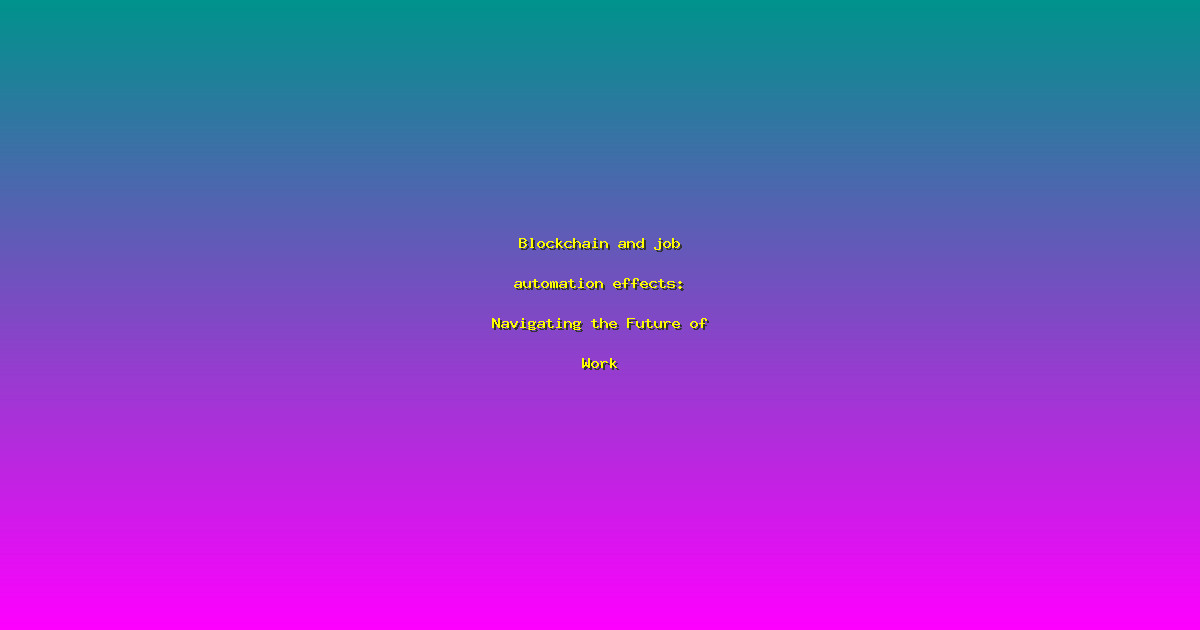Blockchain and Job Automation Effects: Navigating the Future of Work
As technology continues to evolve at a rapid pace, two significant areas of innovation, blockchain and job automation, are transforming the way we work. The integration of these technologies into various sectors is not only changing the nature of jobs but also creating new opportunities and challenges. This article delves into the complex relationship between blockchain technology, automation, and the future of work, providing insights into how these forces are reshaping the job market.
Understanding Blockchain and Automation
Blockchain is a distributed ledger technology that enables secure, transparent, and efficient transactions without the need for intermediaries. On the other hand, automation refers to the use of technology to perform tasks previously done by humans. Both technologies are increasingly being adopted across industries, including finance, healthcare, and manufacturing, leading to significant changes in both the nature of work and the job market.
The Impact of Blockchain on Jobs
Blockchain technology promises to revolutionize industries by streamlining processes and reducing costs. However, its implementation also poses a challenge to traditional job roles. For instance, blockchain's ability to ensure secure transactions without intermediaries could potentially reduce the need for positions involved in financial and legal services. Yet, this technology also creates new job opportunities in blockchain development, management, and security.
Automation and the Workforce
Automation is often seen as a threat to employment, particularly in sectors where tasks are repetitive or routine. However, while it is true that automation can replace certain jobs, it also opens up new possibilities. For example, automated systems can handle mundane tasks, freeing employees to focus on more complex and creative work. Moreover, the development, maintenance, and oversight of automated systems themselves create new job roles that require specialized skills.
Blockchain and Automation Together: A Synergistic Relationship
When combined, blockchain and automation can transform industries in profound ways. For instance, in supply chain management, blockchain's transparency and automation's efficiency can revolutionize logistics, improving traceability and reducing costs. This synergy also creates a demand for a new class of workers who understand both technologies, driving the need for continuous learning and adaptation in the workforce.
FAQs
Q1: How will blockchain technology affect job security in the finance sector?
Blockchain can automate many financial processes, potentially reducing the need for some traditional roles. However, it also creates new opportunities in areas such as smart contracts and decentralized finance (DeFi).
Q2: What is the role of automation in job creation?
Automation replaces some jobs but also creates new ones, particularly in areas like maintenance, software development, and system oversight, thus reshaping rather than just reducing workforce needs.
Q3: Can blockchain technology exacerbate income inequality?
Like any technology, blockchain can have disparate impacts. Those with access to blockchain literacy and skills may benefit disproportionately, potentially widening the income gap.
Q4: How do we prepare for a future where automation and blockchain are prevalent?
Continuous learning and adaptability are key. Workers need to develop skills in digital literacy, problem-solving, and critical thinking to thrive in the changing job market.
Q5: What are the ethical implications of blockchain and automation in the workplace?
Issues such as privacy, data security, and job displacement are crucial. It is essential to consider the ethical dimensions of these technologies and implement policies that protect workers and ensure fair treatment.
Conclusion and Call-to-Action
As blockchain and automation continue to evolve, the job landscape will inevitably change. While these technologies present significant challenges, they also offer tremendous opportunities for innovation and growth. It is crucial for individuals and organizations to embrace these changes, invest in continuous learning, and advocate for policies that ensure a fair and equitable future of work. Let's prepare for the future together by exploring these technologies and understanding their profound impacts on our careers and economies.

